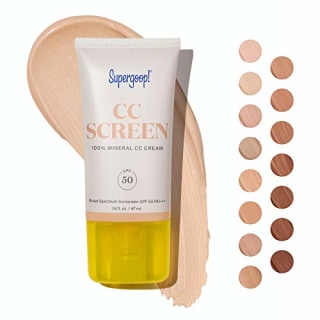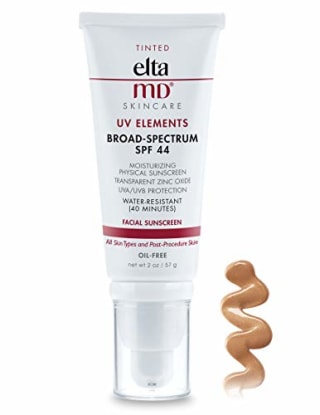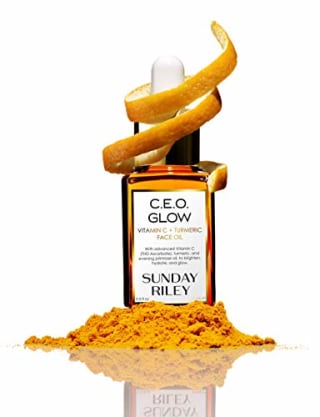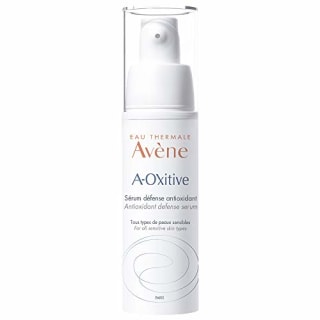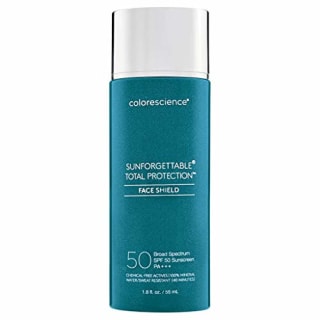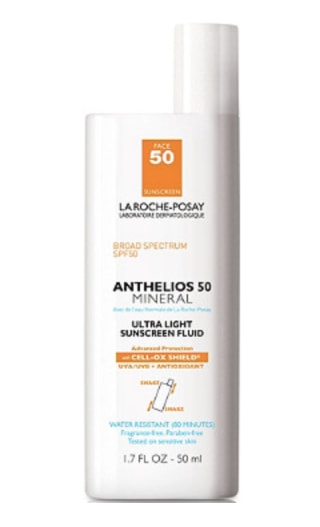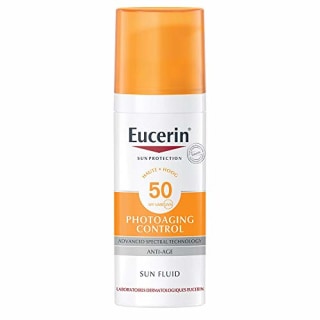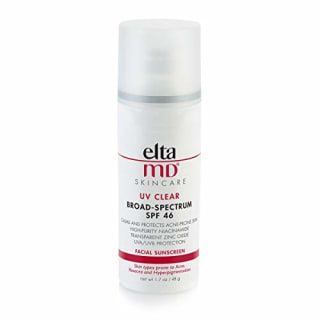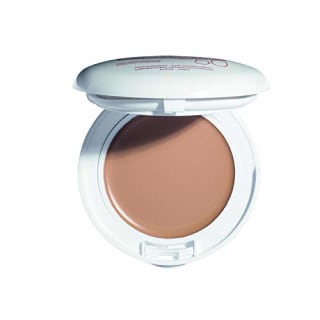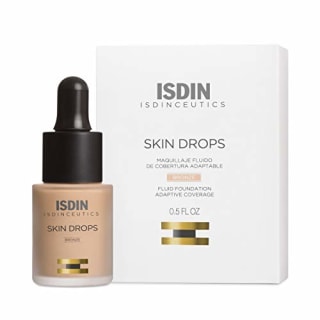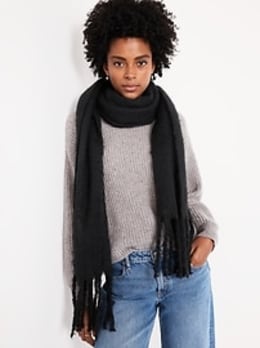Gone are the days when the only type of light exposure we had to worry about was sunlight. In our increasingly tech-savvy world, we've learned that the devices we rely on so much emit something called blue light that can pose its own set of skin care concerns.
But what exactly is blue light and what sort of impact does it have on our skin? And do those skin care products claiming to shield your skin from blue light really work? Shop TODAY is just as curious as you are, so we consulted dermatologists to get some insight on this emerging beauty mystery.
What is blue light and how are we exposed to it?
These days, you'd be hard-pressed to find anyone who doesn't spend a fair deal of time staring at screens on a regular basis. Whether you work on a computer all day long or are attached to your smart phone, we're all exposed to blue light while using our go-to devices.
"Blue light is part of the visible light spectrum. It is a type of high energy visible (HEV) light that the human eye can see," Dr. Edidiong Kaminska, a board-certified dermatologist in Chicago and fellow of the American Academy of Dermatology, told TODAY.
You can be exposed to blue light while using a plethora of devices, but the most common ones are phones, tablets, computers, TVs, LED devices and fluorescent lights.
Why is blue light bad for our skin?
For years, sleeping experts have recommended that we all put down our devices before bedtime since blue light can disrupt our sleep cycle. That can also inadvertently affect your skin.
"Blue light has a major impact on the circadian rhythm, which is the body’s natural sleep rhythm clock. And what impacts the circadian rhythm has the potential to impact the whole body," Dr. Azeen Sadeghian, a dermatologist advisor for AI-powered skin symptom checker app Aysa, said. "This is still a growing area of research, but evidence shows this disruption is not good for our health and it has an impact on skin and skin DNA repair."
Blue light's long-term effects are still being researched, but some experts say that excessive exposure to the light can be somewhat similar to too much exposure to the sun's UVA rays.
"Some preliminary research shows that HEV can prompt the formation of free radicals, which break down collagen and cause inflammation, leading to redness, dark spots and wrinkles. Too much blue light may also darken hyperpigmentation, especially in darker skin tones," Deanne Mraz Robinson, president and co-founder of Modern Dermatology, explained.
Are blue light skin care products worth the hype?
Over the last few years, a crop of skin care and makeup products have hit the market promising to shield your skin from the potentially harmful effects of blue light. They certainly sound great, but Shop TODAY was curious to know: What are the key ingredients they use, and are they really necessary?
"There is no downside to them, but it indicates the need for 'something else' in your skin care routine, which isn't necessarily true if you're already using an antioxidant serum and broad spectrum physical sunscreen 30+," Robinson said. "These are the skin care essentials I recommend for blue light protection and everyday sun protection."
Physical blocker sunscreens in particular can do a great job of curbing the hyperpigmentation that blue light can cause in melasma patients, and tinted sunscreens are another great option.
"There is evidence that tinted sunscreens tend to block more visible light than non-tinted sunscreen. Inactive ingredients in tinted sunscreens — such as iron oxide — and active ingredients — such as zinc oxide and titanium dioxide — will block more visible light than chemical sunscreens," Sadeghian said.
The bottom line? Closely read the ingredients on any product claiming to counteract the effects of blue light and don't underestimate the power of everyday products like sunscreen and serums.
Dermatologist-recommended products for blue light
1.
This three-in-one CC cream protects skin from the sun and blue light and adds some color to help even out skin tone. Flora Kim, MD, FAAD and owner of Flora Kim Dermatology, calls it one of her morning must-haves.
"Iron oxides are third on its ingredient list, meaning that you get a great natural looking tint and blue light protection. Furthermore, with zinc oxide and titanium dioxide, this physical sunscreen delivers true broad spectrum protection," she said.
2.
Physical sunscreens contain several ingredients that help counteract the effects of blue light. This one from EltaMD offers optimum protection against UVA and UVB rays and has a nice tinted formula to boot.
"I love this tinted mineral sunscreen as it provides a powerful quartet of antioxidants, true broad spectrum UV protection (with zinc oxide and titanium dioxide), blue light defense (via iron oxides) and hyaluronic acid for hydration," Kim said.
3.
Antioxidants work overtime to neutralize the oxidative stress blue light can cause, so it's not a bad idea to add an antioxidant lotion or serum to your skin care routine. Sunday Riley's vitamin C oil has an added touch of turmeric to help calm any redness in your complexion.
"Vitamin C products are a great way to lend your skin antioxidant protection. Just be cautious because vitamin C oxidizes easily and not all forms of vitamin C are stabilized. Luckily, this one is and works in combination with other antioxidant ingredients," Sadeghian said.
4.
Free radicals don't stand a chance against this antioxidant-rich, multitasking serum that takes on dull complexions, dryness and fine lines with ease.
"This is a fast absorbing formulation rich in vitamin C, vitamin E and hydrating hyaluronic acid," Robinson said.
5.
Colorescience's physical sunscreen protects skin from UVA/UVB rays, pollution, infrared radiation and blue light and is made without harsh ingredients like dyes, synthetic fragrances and alcohol.
"This broad spectrum sunscreen is good for daily use and also blocks blue light. It’s rich in antioxidant lipochroman and also contains soothing niacinamide," said Dr. Maral Skelsey, director of the Dermatologic Surgery Center of Washington and clinical associate professor of dermatology at Georgetown University.
6.
"Since typical sunscreens may only block UVA and UVB, they won’t necessarily protect against the visible light spectrum. It’s important, especially for those battling melasma, to look for ingredients like zinc oxide that block visible light," Skelsey explained.
La Roche-Posay's mineral sunscreen filters out UV rays and combats environmental damage with the help of zinc oxide and titanium dioxide. "It physically shields the skin from UV and blue light. The texture is light, noncomedogenic and fragrance- and paraben-free, making it ideal for all skin types," Robinson said.
7.
Concerned about UV rays and blue light? Protect your face and neck from premature aging with this fragrance-free, water-resistant sunscreen from Eucerin.
"It contains antioxidants like licochalcone, which neutralizes the free radicals caused by UV and blue light," Kaminska said. "It also contains glycyrrhetinic acid to support the skin's own DNA repair mechanism."
8.
Don't feel like buying a whole new set of products to shield your skin from blue light? You don't have to. "Most products that protect from UV rays will protect from blue light, too," board-certified dermatologist Mary Lupo told TODAY.
Lupo recommends this broad-spectrum SPF from EltaMD that works its magic with the help of zinc oxide. The fragrance-free formula goes on smoothly, moisturizes as it protects skin and clears pores with the help of lactic acid.
9.
Tinted sunscreens are a great way to offer your skin multiple benefits at once. "They're the easiest and most affordable option to fight blue light. To me, it's like killing two birds with one stone — you get UV and visible light protection," Sadeghian said.
Avène's tinted compact combines vitamin E with thermal spring water to soften skin as it shields it from oxidative damage. "It's great because it has iron oxide and titanium dioxide in it, and it's easy to reapply over makeup," Kaminska said.
10.
Skelsey swears by these foundation drops that offer light coverage when mixed with lotion or full coverage when applied alone. The lightweight formula might be part of your makeup routine but it also offers skin care benefits. "They contain powerful zinc oxide to block visible light," she said.
For more stories like this, check out:
- 13 facial sunscreens dermatologists actually recommend to patients
- Chrissy Teigen revealed her 7-step skin care routine on Instagram
- The complete A-to-Z guide to skin care
- From face rollers to a dark spot cream, a dermatologist shares tips for 5 skin concerns
To discover more deals, shopping tips and budget-friendly product recommendations, download the new TODAY app and subscribe to our Stuff We Love newsletter!


